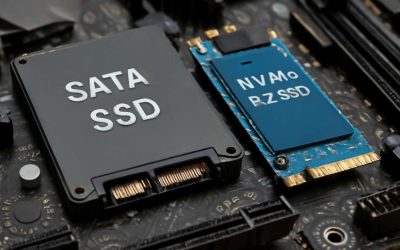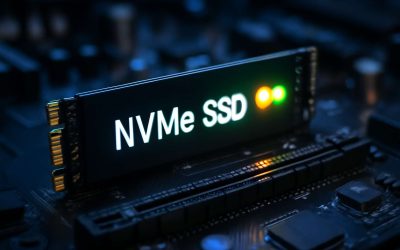
NVMe (Non-Volatile Memory Express) is a storage interface that transfers data between an SSD and a computer’s motherboard via the PCIe bus. This is an ideal way to connect a SSD and improve performance in modern PCs because it has lower latency, higher input/output per second (IOPS), less power consumption, and a better total cost of ownership.
Nvme drives are available in a variety of form factors, including M.2 and 2.5-inch SSDs. They’re also a great choice for servers, as they can boost performance in the cloud. Nvme drives are faster than SATA-based drives, so they’re a good option for gamers or anyone who wants to experience top gaming and video editing speeds.
A key advantage of NVMe over SATA is the ability to support multiple queues, which means that the underlying storage can be used more effectively. Queues are a way for the underlying storage to be accessed more quickly by the CPU, and they can help make NVMe drives up to 25x faster than SATA-based SSDs.
Another benefit of NVMe is its high capacity: NVMe drives can hold up to 8TB, which is a huge amount of storage space. That’s especially helpful for users who are constantly on the move, as it makes it easier to store large amounts of data.
These high-capacity NVMe drives can handle the heaviest workloads and provide a smoother experience for all your applications. They also offer improved reliability, so you’ll be able to avoid downtime and keep your website up and running smoothly.
XTS-AES 256-bit encryption is also provided by NVMe drives, so you can rest easy knowing that your data is safe from theft and tampering. Moreover, NVMe supports TCG Opal 2.0 security management solutions for added protection.
NVMe can handle a huge amount of data and is more efficient than SATA drives. This is because NVMe uses multiple I/O queues, which are much better at handling big loads than SATA.
This is important for websites that receive a lot of traffic, as it can speed up the processing time and improve load times. NVMe can also handle data from multiple sources simultaneously, which is useful in applications that need to process a large volume of data, such as eCommerce stores and blogs.
It’s also worth noting that NVMe SSDs are prone to overheating under heavy loads, so they should be equipped with a heatsink. Fortunately, NVMe SSDs are starting to come with heatsinks built into the drives, which can reduce the risk of overheating.
The price of NVMe drives can vary depending on the manufacturer and the storage capacity you need. Generally, NVMe drives can be more expensive than SATA-based models, but they’re also a great option for gamers and anyone who wants to improve their PC’s performance.
NVMe is an industry-standard storage technology that utilizes the PCIe bus to transfer data to and from NAND flash memories. It is backed by an ever-growing consortium of hardware and software vendors.



0 Comments